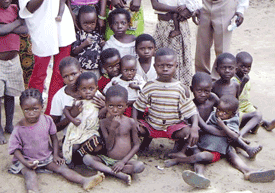|
|
|||||
|
|
Malaria, one of the great global killers, weighs most heavily on Africa and its young children:
To confront this daunting public health problem, heads of state and representatives from 44 African countries met in Abuja, Nigeria, on April 25, 2000, and signed the Abuja Declaration, committing their countries to halve malaria deaths in Africa by 2010. This event is commemorated every year on Africa Malaria Day, offering an annual opportunity to raise the world’s awareness of Africa’s fight against malaria. The Abuja goal is indeed achievable:
To mark Africa Malaria Day 2005, major events will be held worldwide, including Lusaka, Zambia; Washington DC, USA; and Brussels, Belgium. This year’s theme, “Unite Against Malaria,” and the associated slogan, “Together We Can Beat Malaria,” underscore the importance of collaboration among all stakeholders, as exemplified by the Roll Back Malaria Partnership. Africa Malaria Day 2005 will also be an occasion to take stock of the situation, midway toward the goal of 2010. The Abuja Declaration proposed intermediate targets, to be reached by 2005: 60% of people suffering from, or at risk of, malaria would have access to treatment and protective measures. Evaluating the extent to which these interim targets have been reached will guide the efforts of the next 5 years, toward the ultimate goal of halving malaria deaths by 2010. ResourcesWorld Health Organization – Regional Office for Africa – Africa Malaria Day Roll Back Malaria – Africa Malaria Day
Page last modified : April 7, 2005 Content source: Division of Parasitic Diseases National Center for Zoonotic, Vector-Borne, and Enteric Diseases (ZVED)
|
|
||||||||||||||||||||||||||
| Home | Policies and Regulations | Disclaimer | e-Government | FOIA | Contact Us | ||||||
|



